A behind-the-scenes look at two Michigan festivals from 1970.
“We are stardust, we are golden, and we’ve got to get ourselves back to the garden” - Joni Mitchell
Michigan hosted over a dozen successful music festivals in 1969. With the images and sounds of Woodstock in the air and in the marketplace, it seemed that 1970 could be a prime year to offer more such events to rock and roll lovers across the state. But by the end of August, the festival scene in Michigan was on life support; a victim of the courts, conservative politicians, law enforcement, a fearful public, and the callousness of festival attendees. This is a tale of two of them: Goose Lake in Jackson County and Super Tuesday in Bay County.
Perhaps the “garden” of Woodstock in 1969 was just an illusion. In reality, the afterglow of the festival, immortalized in Joni Mitchell’s song, didn’t seem to last long. The mess that was the Altamont Speedway Free Festival, less than four months later, came to be viewed by pundits as the end of the hippie era and the symbolic death of the Woodstock Nation. Rolling Stone magazine called Altamont “rock and roll’s all-time worst day”.
Maybe some of the bad karma from Altamont was till around in 1970. On the political front, President Richard M. Nixon did an about face on his campaign promises and ordered U.S. troops into Cambodia in the spring, which in turn prompted campus protests across the U.S. This led directly to an incident at Kent State University in Ohio where unarmed students were fired upon by the Ohio National Guard on May 4th, resulting in four students killed and nine others wounded. A shocking Gallup Poll taken immediately after the shootings reportedly showed that 58% of the respondents blamed the students, while only 11% blamed the National Guard and 31% expressed no opinion. Ten days later, two students were killed and twelve wounded by police at Jackson State University in Mississippi under similar circumstances.
The most depressing news in the music industry in 1970 was the break-up of The Beatles, one of the most popular and influential musical groups in history and the avatars of peace and love movement. Crosby, Stills, Nash & Young, a new supergroup, had emerged from the Woodstock festival as musical spokespersons for the new decade. CSN&Y had a Top 20 hit in March of 1970 with their upbeat cover of Joni Mitchell’s “Woodstock”, but their next release in May was “Ohio”, Neil Young’s protest song about the Kent State shootings that quickly became a counterculture anthem. 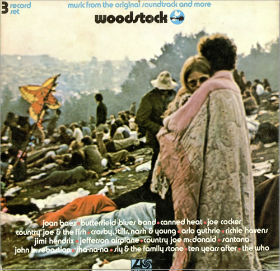 Woodstock 3 LP
Woodstock 3 LP
The release of the hit Woodstock movie and its # 1 soundtrack album in the spring of 1970 seemed to rekindle the Woodstock spirit and reignite interest in Michigan’s burgeoning rock festival scene that had grown steadily during the past three years. By the end of summer, however, the rock festival era in Michigan had ground to a halt, as exemplified by both the relatively small Super Tuesday – Outdoor Rock-Amusement Festival at Roll-Air in Bay City and the enormous Goose Lake International Music Festival in Jackson County.
Despite the success of Roll-Air’s 1st Michigan Pop Festival in August of 1969 in Bay City, the event was not destined to have a long life. The following year, a second festival was scheduled at Roll-Air for August 18, 1970. Things had changed considerably from the previous year. The name ‘Michigan Pop Festival’ had been jettisoned, and the flyer for the event advertised it as the ‘Super Tuesday – Outdoor Rock-Amusement Festival’. The event boasted two stages and promised 9 hours of non-stop rock & roll from 3 p.m. until midnight, with tickets costing $4.00 in advance or $5.00 at the door. 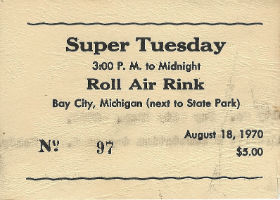 Super Tuesday ticket
Super Tuesday ticket
The festival also had a new booking agent. Mike Quatro had sold his agency to Dave Leone who changed its name to the Diversified Management Associates. Leone, who booked the acts for the second festival, first gained prominence by opening the Hideout teen clubs in the Detroit area. He had also established the Hideout Record label which had issued singles in the 1960s by The Pleasure Seekers, The Underdogs, The Mushrooms with Glenn Frey, and the early 45s by Bob Seger and the Last Heard, including “East Side Story” and “Heavy Music”, which were licensed to Cameo-Parkway Records for distribution.
The headliners were announced as The Frost, along with SRC, Teegarden & Van Winkle, and the Bob Seger System. The undercard listed Ormandy, 3rd Power, Brownsville Station, the John Drake Shakedown, and Suite Charity. The most interesting act, not even listed on the flyer, was a little-known band with the unusual name of Alice Cooper that had recently relocated to Michigan from California. 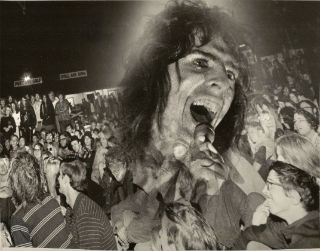 Alice Cooper and Super Tuesday crowd
Alice Cooper and Super Tuesday crowd
Police agencies, which had been caught off guard by the big crowd at last summer’s Michigan Pop Festival at Roll-Air, had 12 special sheriff’s deputies on hand to keep an eye on the crowd and to make sure that the festivities ended at midnight.
Despite the stellar lineup of bands, the festival was a financial disaster. The weather didn’t help; as it rained along with thunder and lightning the night before, and the rain continued for most of the following day. That made it pretty uncomfortable for festival-goers since Roll-Air did not have a roof. An audience of over 3,000 was expected but only about 1,000 braved the wet elements and paid to get in. Many others, however, decided to stay outside the gates and listen to the music for free, thereby inadvertently contrbuting to the event's financial woes. Law enforcement reported no evidence of drug use but that might have been because it was too wet to fire up many joints.
Roll-Air owner, Bob Darbee said: “We took a real bath on this one” (No pun intended). He also stated that over $4,000 had been lost and that Tuesday’s extravaganza was the last such event they would have. “We’re going to have to come up with something different for next year” he said. “You can’t have big name entertainment like this without paying big money and to do that, you need big crowds.” $4,000 dollars does not sound like a large amount today but the owners of Roll-Air, Darbee and Octavian Gavrila, were educators employed by the Bay City Public Schools and the yearly salary for an experienced teacher was in the neighborhood of $7,500.
The Frost was paid $1,200 to be the festival’s main headliner and closing act but, because some bands went over the 45-minute set limit and the police-enforced midnight curfew on music, they were restricted to a 15-minute performance.
An unhappy Dick Wagner was interviewed about the disappointing turn out following The Frost’s brief set. “Things like this are down attendance-wise all over”, he said. “First, because the economy is down and the kids have less money; and secondly because many, many kids are spending the money they do have on drugs.” When asked about the $5.00 admission price for the Super Tuesday event, Wagner responded: “It’s too much for the kids. They can either go to these things, buy a record they can listen to for six months, or buy their drugs which they think they need. Most of them are opting for the last two.” 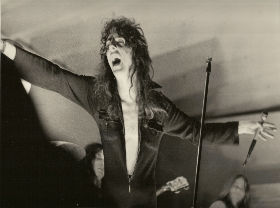 Alice Cooper on stage at Roll-Air
Alice Cooper on stage at Roll-Air
On the plus side, the Super Tuesday Festival might have been the first time that Alice Cooper and Dick Wagner shared the same stage. Two years later, The Frost was long gone and Alice Cooper had become one of rock’s biggest attractions. Wagner went on to lead a short-lived band called Ursa Major and then became a very successful session musician. He played guitar on several of the Alice Cooper’s hit albums: “School’s Out”, “Billion Dollar Babies”, and “Muscle Of Love”.
When Alice left his original band to go solo, he and Wagner started a songwriting partnership. Beginning with “Only Women Bleed” in 1975, Dick Wagner would go on to co-write some of Alice Cooper’s biggest solo hits of the late 70s: “Welcome To My Nightmare”, “Department Of Youth”, “I Never Cry”, “You And Me”, and “How You Gonna See Me Now”.
As disappointing as the Super Tuesday event in Bay City was to its organizers, the death knell for the festival era in Michigan had been rung the week before at the gigantic Goose Lake International Music Festival in Jackson County. 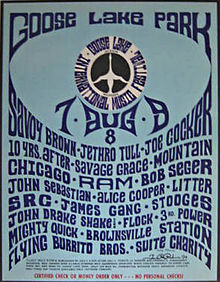 Goose Lake poster
Goose Lake poster
The event was going to be Michigan’s answer to Woodstock in the summer of 1970. Most people saw the original Woodstock festival as a major event that best exemplified the peace and love ethic of the hippie counterculture under some extremely difficult conditions; but Richard Songer saw it as a major business opportunity.
Songer was a thirty-five-year-old Michigan businessman who had made a lot of money in the construction business. Armed with a novel idea to construct the nation’s first permanent outdoor rock festival site, Songer purchased 390 acres of farmland in Leoni Township in Jackson County to create Goose Lake Park. Hoping to avoid the pitfalls that plagued the Woodstock festival, the park was enclosed by strong fences, and featured free parking, ample restrooms, a camping area, showers, dune buggy and motorcycle trails, a clean lake for swimming, a custom-designed music bowl and sound system, a revolving stage, and open kitchens.
It seemed like the perfect set-up. Appetites for another major festival had been whetted in the spring of 1970 with the release of the Woodstock documentary film and its 3 LP soundtrack album that quickly reached # 1. Of course it was much nicer to enjoy the Woodstock experience in the comfort of an air-conditioned movie theater or listening to the soundtrack in the comfort of one’s living room rather than dealing with the rain, mud, and overcrowding of the actual event. 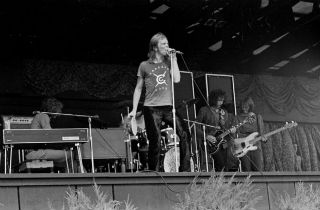 Scott Richardson and SRC at Goose Lake
Scott Richardson and SRC at Goose Lake
Songer’s brainchild was constructed to fulfill “a dream of building a park where young people could get together and have a good time.” The Goose Lake festival was set for three days from August 7 – 9 and featured an all-star line-up of rock acts booked by Grande Ballroom impresario Russ Gibb and the venue’s manager Tom Wright and included Jethro Tull, Ten Years After, Mountain, Chicago, Rod Stewart and The Faces, The Flying Burrito Brothers, The James Gang, and John Sebastian. Unlike Woodstock, which featured no Michigan performers, the Motor City was very well represented by Bob Seger, SRC, The Stooges, Savage Grace, John Drake's Shakedown, Third Power, Brownsville Station, and Mitch Ryder’s new band, Detroit.*
Although Songer seemed to have all the bases covered, the seeds of his downfall had been planted well before he bought the property. First and foremost, Richard M. Nixon had taken office in 1969, portraying himself as a figure of stability during a period of national unrest and upheaval. During the presidential election of 1968, he appealed to what became known as the “silent majority” of socially conservative Americans who disliked the hippie counterculture and the anti-war demonstrators. 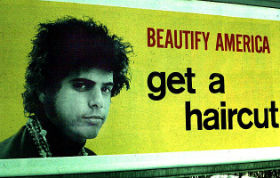 Get a haircut billboard
Get a haircut billboard
Some forty-five years later, it might be hard to imagine a time when the length of one’s hair could prompt evil looks, insults, school suspensions, threats, and even physical violence in many parts of the country. The late 60s even saw the infamous “Beautify America…Get a Haircut” billboards in Michigan and across the United States. Long hair was an integral part of the “hippie uniform”, and if you chose to wear that uniform, you had to be prepared for the possible consequences.
The city of Jackson is the county seat for Jackson County and is considered one of the birthplaces of the Republican Party. It, like most of southwest Michigan, was a politically conservative area in 1970 and continues to be to this day. Songer had proposed his plan to Leoni Township in March of 1970 and it was protested by the Goose Lake Property Owners Association in April, even though the land’s zoning allowed for a park to be built and there were no ordinances on the books that would prevent a festival from being held on the property. Those facts did not prevent some lawsuits from being filed, and a very negative word-of-mouth campaign was undertaken throughout Jackson County claiming that the project would “pollute the area and bring in an invasion of hippies.” 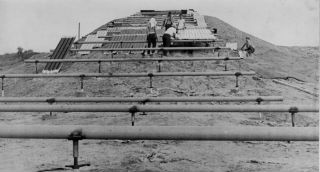 Goose Lake's stage being constructed
Goose Lake's stage being constructed
Songer went ahead with his dream project despite the local opposition. On August 3rd, four days before Goose Lake was to open, Jackson County Prosecutor Bruce A, Barton went to Jackson County Circuit Court and asked for an immediate restraining order to cancel the festival, which he claimed would be too big, not to mention lewd and crazy, for law enforcement to handle. Somewhat surprisingly, however, Judge John C. Dalton turned him down. **
On August 4th, Songer placed an advertisement in the Detroit News that included a personal message to all the “brothers and sisters” that listed all of the amenities of “Goose Lake Park – The World’s First Permanent Festival Site”. With clear skies in the forecast and lots of people hoping to catch some of that 1969 Woodstock magic that was still in the air via the movie and its soundtrack, approximately three times as many people came to the Goose Lake Festival than were expected. 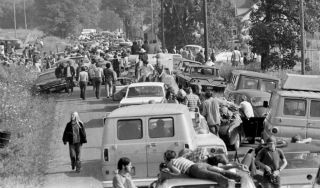 Goose Lake Festival traffic
Goose Lake Festival traffic
Unfortunately for Songer, less than a quarter of the estimated 200,000 attendees paid for tickets despite the reasonable price of $15 for the three-day event. With security overwhelmed by the crowds, members of the White Panther Party as well as some area bikers were recruited to patrol the 12 foot metal link fences that surrounded the park. These “guards” apparently let thousands through openings cut into the fences for free or for less than the price for admission, which they then pocketed.
This idea that the “people’s music and culture” were being overtaken and exploited by the business types, like Songer, who were running the events seemed to have started with often violent radical left wing groups like The Motherfuckers from New York who put forth the unrealistic declaration that “music should be free”. This attitude seemed to take root during 1970 and groups advocating free music in some cases disrupted or caused financial losses at that year’s Isle of Wight Festival in England, the Transcontinental Pop Festival in Canada, and even the Ann Arbor Blues Festival. Sadly this advocacy of free music fostered disrespect for the people who worked hard to put on the festivals and a disregard for the performing artists who were trying to make a living by playing rock and roll. 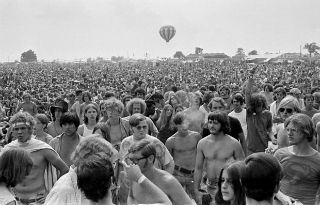 Part of the estimated crowd of 200,000
Part of the estimated crowd of 200,000
Even with all of the problems inherent with a gathering that large, by most accounts, almost everyone attending and performing at Goose Lake seemed to have had a good time. Although there was some casual nudity, the young people were, on the whole, well-behaved and polite and reportedly were happy to share with others during the event. There were no deaths during the three-day festival and there were no serious injuries. Several hundred attendees were treated for “bad trips”, however, some of which came from ingesting a horse tranquilizer that was being sold by unscrupulous dealers who had set up shop in the park.
Perhaps fearful of murderous hippie cults along the lines of the Manson family who were currently on trial for the Tate-La Bianca murders in California and long-haired youths in general, families living in the Goose Lake area were said to have cleared their kids out. One resident was quoted as saying about the festival-goers: “These kids are in complete rebellion against God, against government, against authority, and against parents.” Husbands reportedly stayed home from work, and many kept rifles and shotguns loaded just in case they had to protect their homes from the hippie hordes. Others sat along the lake shore watching the skinny dippers with binoculars. 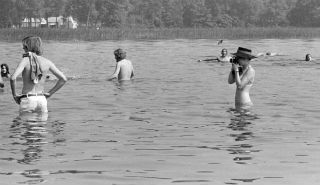 Festival goers skinny dipping in Goose Lake
Festival goers skinny dipping in Goose Lake
The sheer mass of people at the event, the loud music, and the nudity were all foreign to the people living in Jackson County; but most of the attention was focused on the open use and sale of drugs at Goose Lake. In his history of Detroit rock’n’ roll, Grit, Noise And Revolution, author David A. Carson offered an unflattering description of the drug scene at the festival: “As dopey eyed fans moved through the dusty garbage-strewn paths at the concert site, they were greeted at every turn by dealers hustling deep inventories of grass, acid, speed, mescaline, and specialty items such as balloons filled with nitrous oxide.” *
More distressing, however, was the appearance of heroin at Goose Lake. In an interview with David Carson, former WKNR-FM deejay stated: “There was a lot of heroin at Goose Lake, not just from the performers either. I saw people with needle stalls, and selling needles on blankets. That was really horrible and I felt that it signaled the end for that era.” * 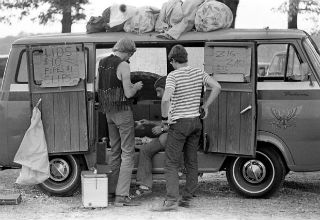 Drugs were sold openly at the festival
Drugs were sold openly at the festival
Carson went on to write: Jackson County sheriff Charles Southworth estimated that "75 percent of the youths were on drugs, but the activities inside the park went completely unsupervised. We can’t go in after them. We’d get mobbed," said Southworth. Although police didn’t interfere with the drug scene inside the park, they made over 160 arrests outside of the festival site, mainly for narcotics violations. In addition, some six hundred illegally parked cars were also towed away from narrow dirt roads leading to the site.” *
“An outraged Governor William G. Milliken condemned the "deplorable and open sale and use of drugs" at Goose Lake. "The promoters may condone it. Some parents may condone it. But I do not," stated Milliken, speaking from the National Governors Conference in Missouri. He requested that State Police director Fredrick Davis "insure that evidence is carefully collected and documented so that drug pushers can be arrested and prosecuted.” Carson also wrote: “State attorney general Frank J. Kelly announced that he would seek an injunction against another festival at the site unless the crowd would be limited to fifteen thousand. "I think we have seen the first and the last rock concert of that size in Michigan," said Kelly. *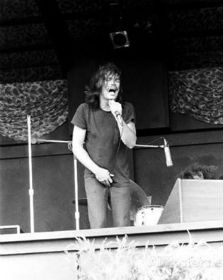 Mitch Ryder
Mitch Ryder
“Jackson County prosecutor, Bruce Barton indicated that he would try to "permanently close" the park. The sheer size of the festival crowd had made policing "virtually impossible," commented Barton, who went on to say that he had "enough evidence so there will never be another rock festival.” *
According to Leanne Smith’s article on Goose Lake for MLive, “Barton filed another injunction prohibiting Songer from advertising, promoting or preparing any other public shows at the park. He said that the festival was a public nuisance and that Songer condoned the open sale and use of drugs. This ruling went in Barton’s favor. Songer appealed to the Michigan Court of Appeals but lost. The injunction became permanent in 1972, making the Goose Lake International Music Festival the only rock festival ever at the park.” **
“Songer was indicted in October 1970 by the Jackson County Citizens Grand Jury and charged with aiding and abetting the sale of heroin and marijuana and having heroin and marijuana under his control without a license. He was found guilty by a jury in December 1971.” ** 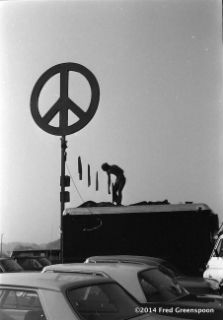 End of an Era
End of an Era
After losing his court battles, Songer converted his property into a drive-through animal zoo and a campground. Following a rash of tax problems in the mid-1980s, Songer sold the land. Today the former site of the Goose Lake Festival is called the Greenwood Acres Campground. The Goose Lake speaker and light towers are still on the property. The front of the former stage area has been enclosed as part of a recreation center and the revolving portion has been removed. **
While writing his 2005 book on Detroit rock, David Carson interviewed Dennis Frawley, the former minister of propaganda for the White Panther Party who was at Goose Lake and was familiar with its aftermath. "It was too bad about Songer. He was a nice guy and meant well, but I think the whole thing just got too big to maintain that peace and love thing." commented Frawley. "It got ugly. Goose Lake was really the beginning of the end for the whole pop festival scene that had been going on in Michigan." *
Sources:
* David A. Carson. Grit, Noise And Revolution - The Birth of Detroit Rock 'N' Roll, University of Michigan Press 2005.
** Leanne Smith. Michigan's Woodstock Transformed Goose Lake into a Nest of Peace and Love in 1970, mlive.com 2015,
Bay City Times microfilm archives at the Wirt Library in Bay City.

